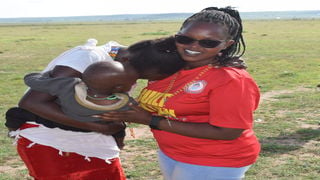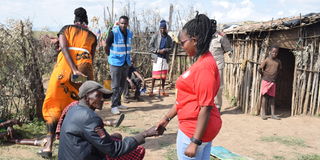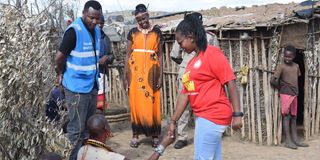
Linet Mboona is received by her emotional sister at their home in Mugur village Samburu Central on Monday December 11, 2023.
| GEOFFREY ONDIEKI| NATION MEDIA GROUPNews
Premium
Samburu girl who escaped early marriage, FGM returns home after 8 years
What you need to know:
- Linet Mboona, 19, was uncertain of the dynamics back home and how her parents would receive her after she escaped. Having not seen her parents for eight years, she was afraid the situation would not be welcoming.
- But, in a surprising turn of events, her father James Lekilit welcomed her and expressed gratitude on the path her daughter was taking in the community.
Linet Mboona shuffled herself through their manyatta (homestead) towards her parents that she had not met for close to eight years.
She collapsed into her mother in a teary embrace, then she kissed both her cheeks. "Supa yeiyo [Hi mum],” Linet greeted her in a Samburu language, in a frail and squeaky voice.
She began blurting out greetings to other family members, as her younger sister broke down in tears. As Linet speaks, she pauses often, and words do not come easily, because of emotional censure.
"I had missed you my dear parents," said Linet as she wiped out tears.

Linet Mboona greets her father Lekilit at their home in Mugur village, Samburu Central on Monday December 11, 2023.
In the moving reunion never seen in Mugur village in Samburu Central, the family got to meet each other for the first time in eight years, bonding almost immediately; giving meaning that blood is thicker than water.
The 19-year-old fled home in 2016 to escape female genital mutilation (FGM) that her family had planned in a bid to give her out for marriage. She is among hundreds of other Samburu girls who had been placed under care and protection in Samburu Girls Foundation since 2016.
When she got wind of the plans to subject her to FGM and marry her off to an old man, she escaped to a neighbour’s house and they linked her the Samburu Girls Foundation, where she secured a place and resumed studies as from class four.
"I am happy to be back home. I have come here [home] probably more informed, mature and resilient than before. I had missed my siblings for sure," said Linet.
Escaping FGM takes a lot of bravery in communities like Samburu where young girls are expected, as a traditional rite of passage, to get circumcised between the age of 9 and 14. She explained, by escaping from home, she may have gone against the community's "traditions" which she termed as harmful.
"It takes bravery to decide to flee home. Just fleeing from your own parents to fight this vice. It is not easy. Although I was young, I knew the cut was wrong, and early marriage would have put off my dreams," Linet said.
In her case, things took a fortunate turn following the intervention of the local administrators and the Samburu Girls Foundation (SGF). After spending about eight years in the safe haven, today she is psychologically stable and resilient.
Despite her ordeal, Linet said she was resolute as she struggled to put the pieces of her life together to ensure she realised her dreams in life. After returning to school, she managed to pass her Kenya Certificate of Primary Education (KCPE) and became a proud champion for change who sailed through pain, stigma, physical and psychological torture to attain top marks.
"I have undergone psycho social support and I developed a strong mentality. I sailed through everything and passed my KCPE in 2021," she said.
Linet is currently in high school.
She was, however, uncertain of the dynamics back home; how their parents would receive her after she escaped. Linet had not seen her parents for eight years and she was afraid the situation would not be welcoming.
But, in a surprising turn of events, her father James Lekilit welcomed Linet and expressed gratitude on the path her daughter was taking in the community.
"I'm happy to see my daughter once more. I like her bravery and I absolutely have no problem with her," said Mr Lekilit.
Linet is optimistic that she will set an example to other young girls in the village to embrace the fight against gender-based violence in the Samburu community. She hopes to become a Catholic nun in the future.
"I really want to be a Catholic nun because I am passionate about it. I pray for God's guidance," she said.

Linet Mboona greets her mother at their home in Mugur village, Samburu Central on Monday December 11, 2023.
Samburu Girls Foundation Executive Director Dr Josephine Kulea hailed Linet's resilience. Dr Kulea also hailed Linet's family for accepting to reunite with their daughter after eight years of escaping forced marriage and FGM.
"The reunion has been positive and we are happy for that. The girl has been away for years," Dr Kulea said.
She revealed that most women in the Samburu community have no say and await orders from elders who cannot be opposed because it is considered a taboo, but Linet broke the ceiling by resisting the vice.
She said that Samburu Girls Foundation will continue to monitor Linet's situation at home during the holiday, until schools open in January.
"We partnered with others development partners to cater everything for her, especially psychosocial support, which is vital. We expect her back to the centre on January so she can prepare for school," Dr Kulea said.
"Usually, when we realise that the ground is safe at their homes, we reintegrate survivors with their families because we do not want to break the family bonds. However, we keep monitoring them," she added.
Dr Kulea said that many young Samburu girls have suffered in the hands of greedy parents who want to enrich themselves by selling their daughters. Girls as young as eight are forced to undergo the cut far away from the glare of the public and law enforcement agents, an exercise that was initially conducted openly amid traditional and colourful celebrations.
Josephine Lengopito who is working with the Kenya-Finland Foundation said they are working to create awareness in the Samburu community on the dangers of FGM and other gender-based violence vices. Early this year, Kenya and Finland signed a multi-million bilateral programme to involve Samburu in the fight against GBV and other harmful practices.
The Memorandum of Understanding (MOU) which was signed in Maralal on April 13, incorporated various stakeholders in multiple projects to eradicate GBV cases in the pastoral region.
"We are working with Samburu Girls Foundation and other partners to create awareness on the dangers of gender violence," Ms Lengopito said.
"We are also supporting them [survivors] in terms of mental health so that when they go home, they are ready to interact with the community," she added.
The Kenya-Finland pact is boosting previous decrees by religious and cultural leaders, who signed agreements in 2020 to abolish gender violence cases in the region. The decrees that were signed by elders and religious leaders, in presence of the then President Uhuru Kenyatta, outlawed retrogressive cultural practices, paving way for alternative rites of passage that honour the rights and well-being of women and girls.
In Samburu, a society where girls are under intense pressure to marry and bear children early, FGM and early marriages pregnancies are rampant in villages. Young girls in pastoral region are facing ever increasing threats to their safety and wellbeing including mistreatment, gender-based violence and exploitation.
Anti GBV campaigners say adolescent pregnancies in the region are generally not the result of a deliberate choice, but most girls often have little say over decisions affecting their lives due to retrogressive cultural practices.
According to the United Nations, gender based violence includes acts that inflict physical, sexual or mental harm and other forms of suffering, coercion and limits on personal freedoms. GBV has long-term consequences on the sexual, physical and psychological health of survivors.
In Samburu County, violence against women and girls is one of the most prevalent human rights violations perpetrated through early marriages, FGM and other forms of exploitations.




